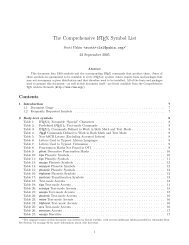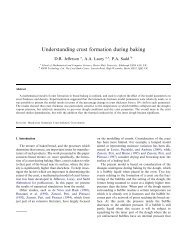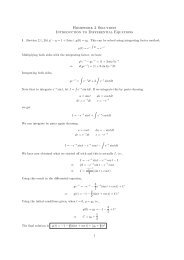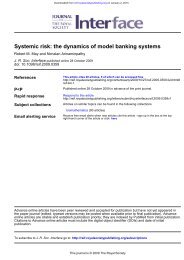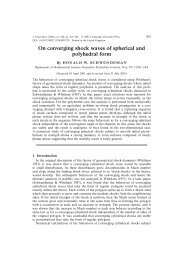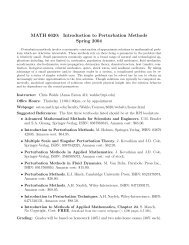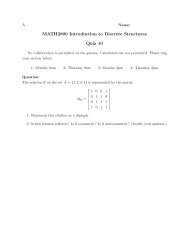ILOG CPLEX C++ API 9.0 Reference Manual
ILOG CPLEX C++ API 9.0 Reference Manual
ILOG CPLEX C++ API 9.0 Reference Manual
Create successful ePaper yourself
Turn your PDF publications into a flip-book with our unique Google optimized e-Paper software.
IloCplex::BranchCallbackI<br />
◆<br />
The parameter data allows you to add an object of type<br />
IloCplex::MIPCallbackI::NodeData to the node representing the branch<br />
created by the makeBranch call. Such data objects must be instances of a userwritten<br />
subclass of IloCplex::MIPCallbackI::NodeData.<br />
protected NodeId makeBranch(const IloNumVarArray vars,<br />
const IloNumArray bounds,<br />
const IloCplex::BranchDirectionArray dirs,<br />
IloNum objestimate,<br />
NodeData * data)<br />
This method overrides the branch chosen by an instance of IloCplex. A method<br />
named makeBranch can be called zero, one, or two times in every invocation of the<br />
branch callback. If you call it once, it creates one node; it you call it twice, it creates two<br />
nodes (one node at each call). If you call it more than twice, it throws an exception.<br />
Each call specifies a branch; in other words, it instructs the invoking IloCplex object<br />
how to create a subnode from the current node by specifying new, tighter bounds for a<br />
set of variables.<br />
◆<br />
◆<br />
The parameter vars contains the variables for which new bounds will be set in the<br />
branch.<br />
The parameter bounds contains the new bounds for the variables listed in vars;<br />
that is, bounds[j] is the new bound to be set for vars[j].<br />
◆ The parameter dirs indicates the branching direction for the variables in vars.<br />
dir[j] == IloCplex::BranchUp<br />
means that bounds[j] specifies a lower bound for vars[j].<br />
dirs[j] == IloCplex::BranchDown<br />
means that bounds[j] specifies an upper bound for vars[j].<br />
◆<br />
◆<br />
The parameter objestimate provides an estimate of the resulting optimal<br />
objective value for the subnode specified by this branch. The invoking instance of<br />
IloCplex may use this estimate to select nodes to process. Providing a wrong<br />
estimate will not influence the correctness of he solution, but it may influence<br />
performance. Using the objective value of the current node is usually a safe choice.<br />
The parameter data allows you to add an object of type<br />
IloCplex::MIPCallbackI::NodeData to the node representing the branch<br />
created by the makeBranch call. Such data objects must be instances of a userwritten<br />
subclass of IloCplex::MIPCallbackI::NodeData.<br />
protected void prune()<br />
By calling this method, you instruct the <strong>CPLEX</strong> branch & cut search not to create any<br />
child nodes from the current node, or, in other words, to discard nodes below the current<br />
node; it does not revisit the discarded nodes below the current node. In short, it creates<br />
<strong>ILOG</strong> <strong>CPLEX</strong> <strong>C++</strong> <strong>API</strong> <strong>9.0</strong> REFERENCE M ANUAL 91



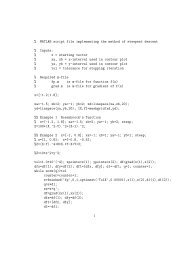

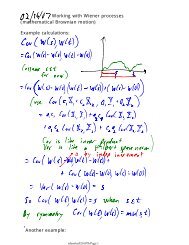

![MATH 1500 Sample Questions Exam 2 1. [3.7] A 10-ft plank is ...](https://img.yumpu.com/43861920/1/190x245/math-1500-sample-questions-exam-2-1-37-a-10-ft-plank-is-.jpg?quality=85)

